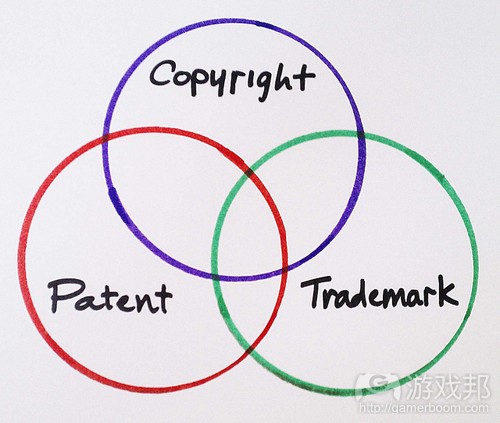解读游戏版权、商标和专利侵权的界定标准
作者:Jas Purewal
问题:为了不侵犯其它游戏,我们应该改变自己游戏的多少内容?
回答:这是游戏开发中最常见的一个问题。但是却不存在解决这一问题的绝对规则。因为一般情况下游戏是由3种不同的IP所构成,即版权,商标和专利(游戏邦注:其实不只这三种,只是它们刚好是最有价值且出现频率最高的内容),而它们也具有各自不同的规则:
版权能够保护大部分的游戏内容,包括音效,图像,代码,脚本等。而关于侵犯版权的测试标准是:游戏X是否抄袭了游戏Y的“所有或大部分内容”。这是一种质量测试而非数量测试,衡量游戏X是否复制游戏Y的“所有或大部分内容”是关于游戏中哪些内容被抄袭了及其品质对原创游戏的重要性,而非着眼于两款游戏的相似度是50%还是77%。因此,在许多版权问题中,即使两款游戏的相似之处不多,但是我们仍能够判断一款游戏侵犯了版权问题。但是这也表示,游戏中的某些内容并未受到版权的保护,如游戏理念或者游戏机制。
商标能够保护游戏的名称,品牌和商誉(例如苹果的logo便属于一种商标)。如果你创作的游戏名称或logo与现有的游戏类似,你可能就会面临法律诉讼(即使你已经为了体现出两款游戏的不同而努力改变了logo)。原因很简单,因为商标冒用的衡量方法是两款游戏是否完全相同或者相似,并且两款游戏中的“商标”(如名字或logo)是否会“引起公众混淆”。所以,这无关你改变了多少(%)游戏内容:但是如果你改变的内容触及了法律鉴定界限,你就有麻烦了。
专利则是游戏中另一大重要IP要素。专利能够从根本上保护你创造的作品:一般情况下,如果是在欧洲你便很难获得软件的专利保护,但是如果是在美国,情况就不同了。专利是一个非常复杂的内容,但是我仍想说:如果别人拥有某款游戏或者其它软件部分内容的专利,而你也感觉到自己侵犯了对方的专利,那么不论你努力修改什么都不会有用,你所面临的最终结果只能是面临起诉。
所以:版权的鉴定方法更加侧重于复制了整体游戏中的哪些内容而不是多少内容。对此你便需要好好衡量自己所复制的内容的重要性。而关于商标,如果你创造的游戏会让用户误以为是在玩早前的一款游戏,那你就要小心了,你可能会扯上难缠的诉讼——赶紧给游戏换个名字吧!最后是专利,这点我们不需要过多的担心:因为我们不会轻易扯上专利诉讼,并且你也很难控制这种事的发生几率,所以在真正发生之前我们可以暂时不用操心。
(本文为游戏邦/gamerboom.com编译,拒绝任何不保留版权的转载,如需转载请联系:游戏邦)
Dear Jas 2: Respecting intellectual property
Jas Purewal
Q: How much do I have to change my game for it not to infringe another game?
Image from Sopio card game, used with permission
A: Ah, one of the most frequently asked questions in games development. Sadly, there’s no absolute rule that will help in this situation. This is because ‘games’ are made up of at least three different kinds of IP rights – copyright, trade marks and patents (there’s more than just those three, but these are the most valuable/frequently seen rights), each of which have different rules:
Copyright protects the biggest part of a game: the sound, graphics, code, script etc. The test for copyright infringement is whether game X copies “all or a substantial part” of game Y. This is a test of quality and not quantity: i.e. in order to work out whether X copies “all or a substantial part” of Y, it’s not a question of whether they’re say 50% or 77% similar, but rather a question of looking at what has been copied and working out how qualitatively important it was to the original game. As a result, in many copyright cases there has been a finding of copyright infringements even though the thing copied was actually very small. That said, some things aren’t protected by copyright at all – like the game idea itself, or its game mechanics. You can read more about copyright and games here.
Trade marks protect the name/brand/goodwill in a game (the Apple logo is a trade mark, for example). If you make a game with a similar name or logo to an existing game, you could face legal action even though you’ve tried to make your logo a bit different to the original. That’s because, very simply, the test for trade mark infringement is whether the two games are identical or similar and there is a “likelihood of public confusion” between the ‘marks’ (i.e. the name or logo) of the two games. So, again, it doesn’t matter by what % you tried to change them: if that legal test is met then you’re in trouble. You can read more about trade marks and games here.
Patents can be the final main IP ingredient in a game. Patents protect inventions basically: generally you can’t get patent protection in software in Europe except in very limited circumstances, but it’s much easier in the USA. Patents are really complex, but I’ll just say this: if someone owns a patent in an aspect of a game or other software, and feels you have infringed that patent, it doesn’t matter what you try to do – you could still face legal action. You can read more about patents and games here.
So: for copyright, the test is more about the relative importance of what’s copied to the whole work, not whether it constitutes X% or Y% of that work. So think about how important the thing you are copying is overall. Regarding trade marks, if you make a game which is at risk of being confused with the original game you could face legal action – so give it another name! And as for patents, well, I wouldn’t worry too much about them: it’s pretty unlikely you’ll ever face a patent claim and, in any event, there’s not much you can do to reduce that chance anyway – so worry about it if it ever happens.(source:gamesbrief)








































 闽公网安备35020302001549号
闽公网安备35020302001549号